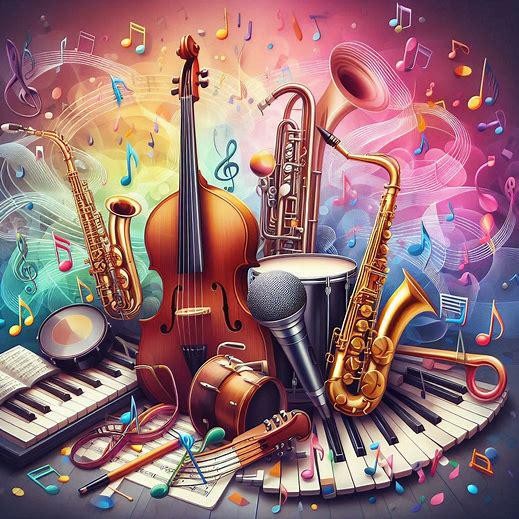
Cart is empty. Please go to your home page for listing it.

A Beginner’s guide to choosing the right instrument
A Beginner’s guide to choosing the
right instrument
A beginner’s guide to choosing the right instrument is
emphasizing on what really your soul wants to play. Whether you’re daydreaming
about serenading crowds, jamming with friends, or just impressing your peers,
picking the right instrument can feel like choosing your love between parents,
family or even friends.
Fear not, fellow beginners, here’s a whimsical guide to help
you find your musical soulmate.
v
The Guitar: For “The Cool Vibes”
If you’ve ever watched a music video and thought, “I could
totally pull off that power stance,” then the guitar might be your ticket to
cool-town. It’s portable, versatile, and has this magical ability to make you
look awesome. Can be played at bonfires to impress strangers or in your bedroom.
v
The Piano: For “The Classically Dramatic”
Maybe you have a flair for the dramatic. You can already
picture yourself in a dimly lit room, fingers flying across the keys as your
friends look on, wondering about your intensity. The piano is for those who
want to make big statements. Instantly makes you seem more sophisticated and
cultured. It’s also great for showing off when you nail a difficult piece.
PS: Good luck carrying this to your friend's house for jam
sessions.
v
The Drums: For “The Energetic and Slightly
Chaotic Souls”
If your motto is “Go big or go home,” the drums are calling
your name. Want to smash things (musically) and have everyone appreciate it?
Drumming lets you unleash your inner animal (maybe cardio).
Pro: You’re the heartbeat of the band and every jam session.
Plus, let’s be honest: it’s fun to hit things.
v
Tanpura: “The Silent Hero of Melody”
At first glance, the tanpura (or thambura) might seem like a
humble, unassuming instrument. It doesn’t play the complex melodies or rhythms
of Indian classical music. Instead, it’s the backbone—the instrument that holds
everything together, creating a continuous drone that provides the sonic
foundation for other instruments to shine.
Fun Fact: Despite not being a lead instrument, a good
tanpura player is essential for setting the mood and keeping the entire
performance in harmony.
v
Sitar: For “The Icon of Indian Classical Music”
The sitar is perhaps the most well-known Indian instrument globally, thanks in part to maestros like Ravi Shankar. It’s a stringed instrument with a distinctive, pear-shaped body, and it often steals the show with its intricate, mesmerizing melodies.
PS: The sitar’s
distinct sound and versatility have made it popular in not only Indian
classical music but also in Western music. Remember The Beatles’ song Norwegian
Wood? That’s the sitar!!!
v
The Violin: For “The Soulful Artist”
The violin has this magical quality that makes every note
sound like it’s part of a beautiful, tragic story. If you have a sensitive,
artistic soul (or just want to play something that looks elegant), the violin
might be your match. Because nothing says “sophistication” like whipping out a
violin at a party.
v
Tabla: “The Rhythmic Pulse”
If the tanpura provides the melodic foundation and the sitar
delivers intricate melodies, the tabla adds the pulse—the heartbeat of Indian
music. It is a pair of drums, played with both hands. The right drum, called
the dayan, is smaller and made of wood, producing high-pitched tones. The left
drum, or bayan, is larger and made of metal or clay, producing deep bass
sounds.
Fun Fact: Playing the tabla is almost like learning a new
language. Each stroke on the drum has its own name, like “dha,” “tin,” or “na,”
and tabla players practice these syllables like vocal exercises.
v
Flute: “The Enchanter of Melodies*
The flute, or bansuri in Indian music, is one of the
most ancient and soulful instruments. Unlike the Western concert flute, the
bansuri is a simple bamboo flute, often without any keys. It’s associated with
the god Krishna, who is famously depicted playing the flute, charming
all who hear it.
v
Veena: “The Regal Stringed Instrument”
The veena is one of the oldest and most revered instruments
in Indian classical music, with a history that stretches back thousands of
years. It’s a large, plucked string instrument with a long neck and multiple
frets, resembling a lute or a sitar but with a deeper, more resonant tone. The
veena is often associated with Saraswati, the Hindu goddess of wisdom
and music.
PS: The veena is considered one of the most difficult Indian
instruments to master, requiring years of dedicated practice to achieve fluency
in both melody and rhythm.
In the end, the right instrument is less about what you
think you should play and more about what makes you feel excited, curious, and
a little bit like a rockstar, even if you’re still learning the ropes. Try a
few out, see what feels right, and remember: no matter what you pick, you’re
bound to have fun and make some noise along the way. For further assistance and
detail, checkout our website, www.shivamusicals.com,
moreover to make a purchase, go to the shopping section of the mentioned
website.
0 COMMENTS